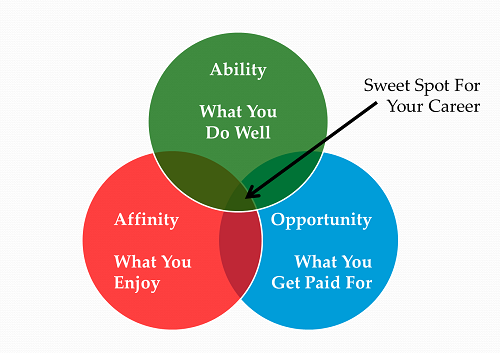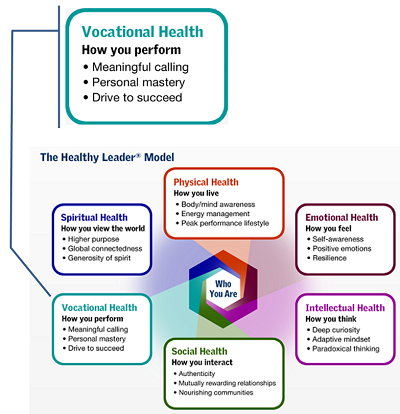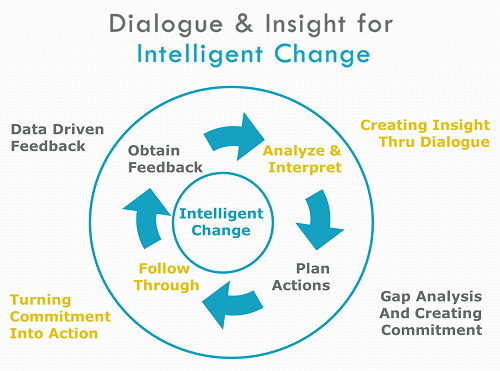When you walk in the room, who shows up for Read more →
The Leader’s Vocational Health
Posted Thursday, May 16, 2013Allen Slade
Decades ago, I heard an old-line manager say “Managers manage and workers work. Never get the two confused.” He saw work as something beneath his pay grade. I suspect his employees felt like cogs in a machine. If so, they probably did the minimum necessary to avoid being “managed”.
The reality is that your vocational health is foundational to your leadership. You lead by example. Your career joy is infectious. Your personal mastery and your drive to succeed set the standard for the people you lead. If you think of work as drudgery, if you don’t control your work self or if you do just enough to get by, your leadership will falter as you pull people down to your level.
In my series of posts on The Healthy Leader® model (from Bob Rosen of Healthy Companies International), we have considered the leader’s physical, emotional, intellectual and social health. Today, let’s look at the leader’s vocational health.
Modified from an image courtesy of Healthy Companies Inc.
Meaningful Calling
Does work energize you or drag you down? Our energy at work is determined in part by our sense of calling. When work is a meaningful calling, it becomes a source of joy and energy for us. When we use our talents fully in our work every day, we are more alive. With my career coaching clients, I talk about calling as the intersection of your ability, your affinity and your career opportunities. When you are in the sweet spot of your career, your abilities are applied to tasks you enjoy, and your contributions make a difference for the organization. If you are not in your sweet spot, you may need to change your job or change your thinking.
When you are in the sweet spot of your career, your abilities are applied to tasks you enjoy, and your contributions make a difference for the organization. If you are not in your sweet spot, you may need to change your job or change your thinking.
Harsh reality can cause us to work outside our sweet spot. We may enjoy something and be quite good at it, but the need for a living wage may force us to do something else. However, over the long run, it is better to adjust your life style downward to take a job in your sweet spot. When I moved from being a professor at the University of Delaware to an entry level HR job at Ford Motor Company, I took a pay cut. When I moved from Microsoft back to being a professor, I took an even larger pay cut. Yet, both times, I moved into jobs in my career sweet spot.
If your work is not a meaningful calling but you cannot change jobs, don’t be a Debbie Downer. Your vocational health may benefit from a change in thinking. If you expect work to be boring, unchallenging and meaningless, it probably will be. On the other hand, if you come to work with a sense of expectation, you will often find meaning. If you look for what is good, true, beautiful and effective, you will usually find it.
Personal Mastery
Jim Clawson says effective leadership is “managing energy, first in yourself, then in those around you.” Your vocational health rises or falls depending on your desire for self improvement. You need to have a clear view of your strengths and weaknesses and a clear path on how you will improve.
At Slade & Associates, we help our clients pursue intelligent change through dialogue and insight.
Intelligent change starts with feedback that is fleshed out through dialogue. As the leader sees gaps, he or she makes a commitment to try something new – what we call a mini-experiment. After following through with action, the leader gets more feedback and contains the virtuous cycle of growth.
Personal mastery takes openness to feedback, commitment to change and personal insight. These things may or may not be in your habitual approach to work. A leadership coach can help you increase your personal mastery and your vocational health.
Drive to Succeed
Your ability to accomplish goals and outperform your peers is essential for your vocational health. Drive to succeed starts with visualizing success, often as a stretch goal. Then, you have an urgent push to accomplish what you have visualized.
Most managers want people with a high drive to succeed. They do not want people who fear failure so much that they avoid difficult tasks or clear goals.
Drive to succeed is related to the personality construct of need for achievement. My research with Mike Rush shows that people high in need for achievement lean in to difficult tasks. If you are blessed with high drive to succeed, you will have a greater level of vocational health.
People who are low in achievement motivation are high in fear of failure. While they do not avoid more difficult tasks totally, they prefer easier tasks or tasks with no clear measure of success. They may avoid jobs with hard and fast goals (like sales). They may avoid getting the degree they need because of test anxiety, an especially potent effect of fear of failure.
Suppose you experience fear of failure? Are you stuck with low achievement motivation and lesser vocational health? Not at all. Personality is not destiny. You can make choices to succeed, and overtime, those choices will become habits that reshape who you are. I have seen coaching clients overcome fear of failure and become more goal driven. I have helped students overcome test anxiety to graduate with honors and go on to graduate studies. It is a matter of choice, with a bit of coaching or mentoring support.
Bottom line: Your vocational health as a leader is built on meaningful calling, personal mastery and drive to succeed. Through career choices and coaching, you can increase your vocational health so that your leadership flourishes.



